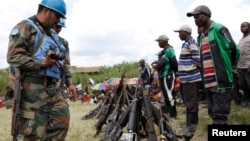The Democratic Republic of Congo’s national army (FARDC) and troops from the United Nations Stabilization Mission (MONUSCO) will soon launch a joint military offensive against Democratic Forces for the Liberation of Rwanda (FDLR) rebels, says Lambert Mende, Congo’s information minister.
“Anytime from now we are ready to start forced disarmament,” said Mende. “Our heads of state will [meet] in Luanda [Angola] to see how to coordinate the operation. But, we are … convinced that there is no way to hope that [the rebels] will [put down their arms] voluntarily, so we have to disarm them by any means.”
Mende said the ultimatum was meant for the FDLR, who he said were non-citizens undermining the country’s stability and security.
He said the government in Kinshasa will deal with other armed groups in the country separately.
Mende’s comments came after a majority of rebels missed a January 2 deadline to voluntarily lay down their weapons or be forcefully disarmed.
He said the military offensive will be supported by troops from the United Nations mission. Mende however, declined to give details of the cooperation with MONUSCO on the launch the offensive.
“Normally we work together with them. We have experience of the M23 [rebels] offensive and the ADF [rebels] offensive. But, I can’t disclose details of the operations,” said Mende.
He also said Rwanda, a prominent member of the Great Lakes region, is cooperating with Kinshasa to disarm the rebel group accused of playing a key role in Rwanda’s 1994 genocide.
“Rwanda is a member of the Great Lakes state and as such Rwanda is taking its [part] in the strategy because it is a regional strategy,” he said.
Mende called on citizens to cooperate with officials from the joint military offensive team to help expedite the process of locating and disarming the FDLR rebels.
Only a few FDLR rebels handed over their weapons before the deadline. Mende said his government has kept its promise to the former rebels who met the deadline.
“They are on their way to Rwanda or to any other third country,” said Mende. “They are in Kisangani and for them there is no problem. They met our requirement, so we shall help them to go firstly to their country and the international community will care for their security there.”




